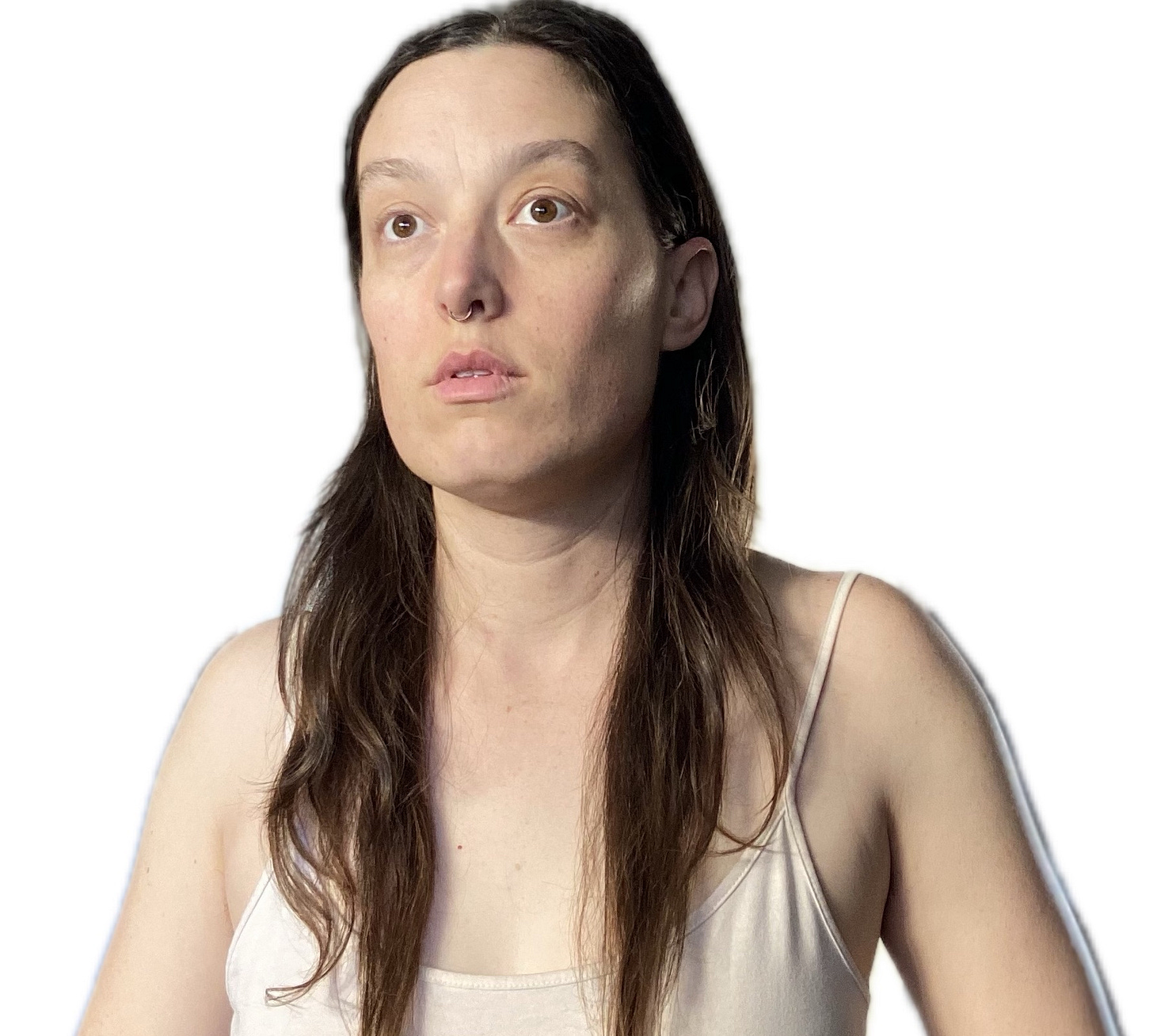writing across the chasm
attempting to translate what it’s been like to navigate, process, and begin to heal as an adult-diagnosed PDA autistic woman, mother, and partner.
bad french, contemplating distances (photo of white woman with long dark hair, standing and staring)
I’ve avoided writing about my experience over the last few years for a number of reasons. The first, and primary reason, is that I’m a neuroqueer, autistic PDAer and my nervous system often makes these decisions for me.1
For example: In the spring of 2020, my body made very clear that it would be a number of years before I wrote again. As I stood in my backyard with this angled and unwieldy realization, I simultaneously mourned and accepted it. I didn’t want to, but I didn’t have a choice. Something in me knew, without hesitation, that my energy would be going elsewhere for the next few years, while another part of me was beginning to trust my own rhythms, rather than trailing my own shame over never being [insert praiseworthy trait] enough.
This wasn’t any kind of otherworldly forethought; forethought is not one of my strengths on the best of days. At the time, I simply knew that the impacts of Covid on our lives were going to be immense and well beyond anything we could imagine. I had no idea how many other aspects of our lives would change and evolve — how much I would change — over the next three years. So much so, that language itself would become something that I felt like I could no longer trust; instead something to be suspicious of, as I’ve tricked myself into so many things through language over the years.
My partner and I often refer to the rickety bridge we crossed over the chasm these last few years, and how challenging it can be to communicate back to those who haven’t (yet) made it over with us. I’m not sure exactly what the chasm itself is, but the side where we were for most of our lives was decidedly ableist (though I would have fought against this notion with everything in me), while the side we’ve landed on is something more like mutual and conscious interdependence. I share this not in an attempt to shame people across the bridge (that definitely wouldn’t work) but instead as an offering: if you can get a little ways onto the bridge, you might be close enough that I can make you a cup of tea and we can sit, doing our best together.
Ableism is so deeply embedded in the life we used to live that, from over here, we can trace its contours in the sediment holding up the other side of the bridge, but you simply can’t see it when it’s the foundation holding you, and everything around you, up. And so, another reason I’ve avoided writing is because the task of translating my experience in a way that bridges the chasm between us has felt too immense. I know the pain of traversing it and asking others to experience deep pain willingly is a challenge for anyone. It’s especially complicated for someone whose most well-worn neurological pathways are those of freezing and fawning to ensure everyone else is always ok, even if I almost never was.
Now that I think about it, I do know what the chasm is, because of course, it’s death.
The chasm is a persistent threat to your life; the sense that where you are walking is not safe and I can promise you that nobody’s tax dollars have gone towards shoring up this particular bridge.
The bridge itself is navigating your own traumas without guidance because not doing so will mean death; it is knowing that where you have come from is so deeply broken and unwell that your child literally cannot live there; it is realizing that the same place was killing you too; it is feeling the pain of knowing you have brought only good intentions to your parenting and those good intentions deeply traumatized your child; it is feeling all the pain you’ve ever stuffed away so that you can become a safe haven for your child, who is deeply wise at 9, and should never have needed to be.
And if I can land anywhere for today, it’s this: if you’re on the bridge now or you’re on the other side and are ready to try to cross, we did our best to fix a few cracked boards on our way over. That, and things really are so much better over here. They really are.
More soon.
I’m doing a good job. You’re doing a good job.
If you want to learn more about Autism, please read Remi Yergeau’s Authoring Autism: On Rhetoric and Neurological Queerness (not it is not a quick, easy, read; yes it’s the most important book I’ve ever read). If you want to learn more about PDA, the Life with PDA section of the PDA Society’s website is a great place to start (and I’m happy to make lots more specific recommendations, too.)



“you simply can’t see it when it’s the foundation holding you, and everything around you, up.”
This is such a useful line. Thank you!
you are doing a good job. ♥️